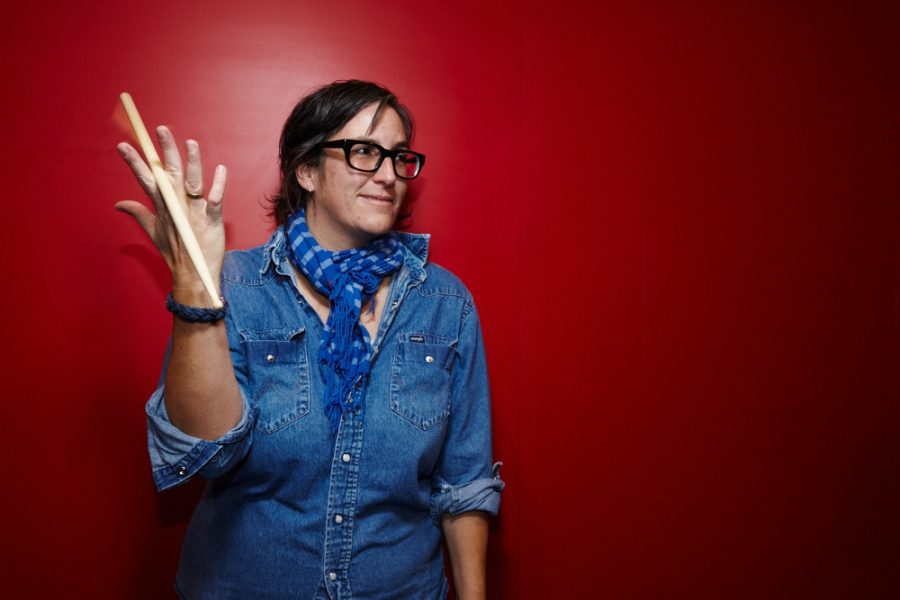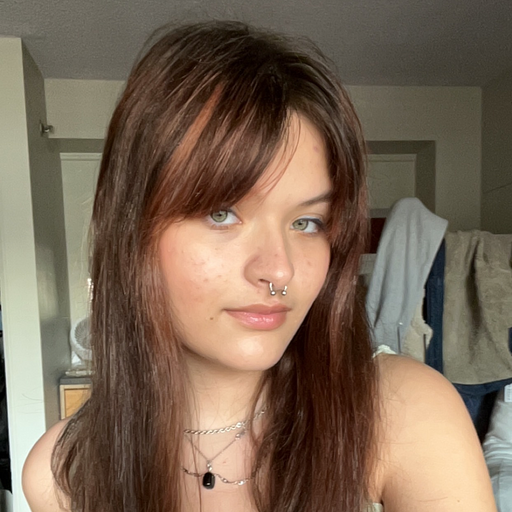Matriarchs of Music | Kate Schellenbach
October 21, 2022
It’s 1987: The Beastie Boys are on their Licensed to Ill tour with Run DMC. They’ve found significant commercial success with their newly adopted hip-hop sound, rapping about “Girls to do the dishes” and “Trashing hotels like it’s going out of style.” But this isn’t where the Beastie Boys started. The Beastie Boys had formed just a few years earlier, originally the Young Aborigines, a hardcore punk band with two additional members: John Berry and Kate Schellenbach.
Kate Schellenbach grew up in New York City, listening to Blondie, The Clash and The B-52s. She was a main player in a group of teens from all over the city; the group seemed to be at all the same shows and record stores — think Dave Parsons’ Rat Cage Records. She spent her teens gigging with these kids and seeing any show she could in any club she could get into. Notably, she saw The Student Teachers at CBGB’s the summer before entering high school. The drummer, Laura Davis, was just a few years older than Schellenbach and they had attended the same school. A band with a female drummer, produced by Blondie member Jimmy Destri, inspired 13-year-old Kate to pick up the drums herself.
I’d like to say the Student Teachers were the most influential gig to Schellenbach, but in 1982, the Bad Brains came from DC to New York. Stars aligned and despite the fairly small turnout, John Berry, Adam Yauch, Mike D and Shcellenbach were all in attendance. The group bonded over The Slits (because of course they did), and were soon, with the addition of Adam Horovitz, playing together regularly.
Schellenbach stayed with the group as they became the Beastie Boys. But in the early ‘80s there was a shift in the city’s sound. Hip-hop took New York by storm, and the Beasties were enamored. They started playing sets broken in two: They’d start with their regular punk set, and then play the back half as a hip-hop group. In 1983 they released a 12-inch single, featuring “Cookie Puss.” This was the last Beastie Boys track that Schellenbach would play on. Kate returned from a trip to London to find the boys in matching red tracksuits, led by Rick Rubin. Rubin had informed the trio that they could be the first white rap group to make it big, but they couldn’t do it with a girl in the band.
Schellenbach took a break from the gigging, the parties and the clubs. She went to Hunter College in New York and graduated with a BFA in studio art. She worked as a photo researcher in an archive. But she didn’t stay away from the scene for long. In the late ‘80s she saw the Lunachicks play and rekindled her love for drumming. She toured with the Lunachicks, and upon arriving back in the city, she reconnected with old friends, Jill Cunniff and Gabby Glaser. The two, along with Vivian Trimble, had recorded a demo as the band Luscious Jackson.
Record companies kept sending the demo back, wanting changes, but the Beastie Boys had recently started their own label called Grand Royal. Mike D liked the demo, and with the addition of Kate on drums, the album was the first release under the new label.
Luscious Jackson has a very distinct sound. They’re broadly categorized as alt-rock, or sometimes rap-rock. But there’s something to be said for their similarities to the Beastie Boys — it’s a specific post punk-inspired comedic rap, heavy-on-the-samples sound. A unique sound I deeply love. But those early ‘80s New York influences stuck to both groups. Punk legends like the Bad Brains and Dead Kennedys, as well as hip-hop influences like Run DMC and Kurtis Blow found a sort of melting pot in the kids that followed them around New York.
In 1993, Luscious Jackson started touring. They opened for The Breeders in Europe and the US. Schellenbach would later enter a relationship with Breeders bassist, Josephine Wiggs. In 1994 they toured with bands like the Flaming Lips, Funkadelic and even their old friends, the Beastie Boys. They played Lollapalooza that year and Saturday Night Live a year later. In 1995, they toured with REM and played at Madison Square Garden. Their single “Naked Eye ” hit No. 25 on the Billboard Hot 100 in 1997. They kept up an impressive schedule until 2000 when the band decided it was time to get off the road.
Things had shifted in the music scene. While the early ‘90s were great for female musicians, the late ‘90s brought an era of what Schellenbach herself called “meatheads.” Radio stations went from playing songs full of women to telling Schellenbach they couldn’t play Luscious Jackson because they were already playing Hole, or Garbage or any other broadly alt-rock band — because there wasn’t room for more than one band of women anymore. In 1999 two women were raped in the Woodstock moshpit, women in music were oversexualized and under-respected. It was reminiscent of 10 years earlier, of Rubin telling Schellenbach he didn’t like the sound of a woman rapping. Women were getting less and less play time. It was the era of Korn and Limp Bizkit. Luscious Jackson wasn’t doing as well as they had been, and although Schellenbach says she wasn’t ready to stop, they did.
Schellenbach fell in love and moved to Los Angeles. Her time organizing tours and working in music production gave her skills that transferred to TV production. She worked as a researcher on Ellen, and currently works as a producer on The Late Late Show. She plays with a cover band called Push Buttons, made up of former pro musicians. Luscious Jackson reunited in 2012 and released albums Magic Hour and Baby DJ in 2013. The band still performs once in a while with a DJ and Schellenbach still loves it.
Schellenbach remains a name to know in the music industry, and a respected influence of many. She lives with her partner and their kids in L.A. She often posts old pictures of herself with the Beastie Boys on Instagram. She wrote a chapter in their book, Beastie Boys Book, and Ad-Rock and Mike D have since owned up to how stupid they were when they kicked her out of the band. They shouted her out in their speech after being inducted to the Rock and Roll Hall of Fame. Schellenbach remains my hero, and a matriarch of the industry.































